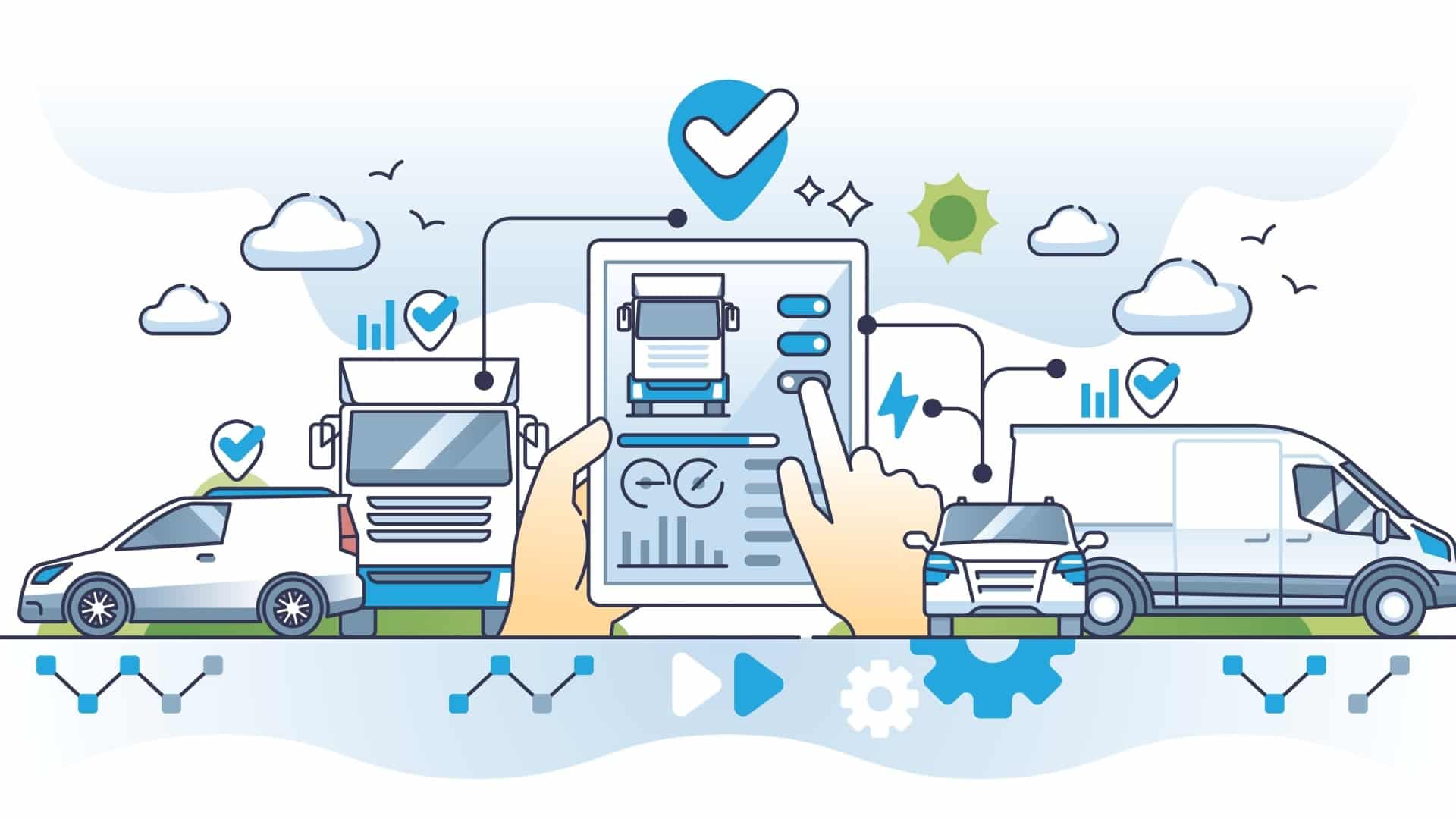IoT in Fleet Management: Benefits, Use Cases and Trends

Introduction: Enhancing Fleet Operations
Fleet management solutions boost operational efficiency, cost savings, and safety. Specifically, the benefits of fleet management apply to transportation-dependent organizations. These systems improve route planning, use real-time GPS monitoring, and automate maintenance cycles to lower fuel consumption and vehicle wear. Consequently, it cuts operating expenses. Fleet management technologies also reduce accidents and enhance traffic and safety compliance while tracking driver behavior and vehicle diagnostics. Thus, these systems boost customer satisfaction by providing trustworthy and fast service.
Telematics, artificial intelligence, and the IoT are preparing fleet management for future generations. For the sake of your information, transportation, discrete manufacturing, and process manufacturing account for one-third of worldwide IoT investment. These technologies connect with fleet operations for more detailed data insights and predictive analytics to help organizations make faster choices and stay profitable in a changing market.
Key Benefits of Advanced Fleet Management
Enhanced Fleet Efficiency and Cost Management
The benefits of fleet management systems are magnified by enhancing vehicle utilization and cutting operating costs. They use strong route optimization algorithms to route each vehicle while saving idle time and fuel consumption. Fleet managers may use real-time GPS monitoring to find vehicle positions and traffic conditions for proactive rerouting to lessen delays and conserve fuel. IoT integration in fleet management enables predictive maintenance while constantly assessing vehicle health. Such a proactive method increases fleet vehicle lifetime by addressing maintenance issues before they escalate and avoids pricey outages.
Telematics-savvy fleet operators save fuel costs by 14%, according to a Telematics Wire Market study. It proves that technology use and cost-effectiveness are linked. Fleet management systems automate driver behavior data gathering to enforce driving rules that lower fuel usage and accident risk. This proactive approach to safety not only enhances overall fleet safety but also leads to lower insurance costs due to improved safety records and fewer accidents.
Data Analytics in Fleet Management
Similarly, benefiting from the rich data analytics enabled by fleet management, decision-making is streamlined. Fleet management systems provide operational dynamics insights that inform strategic choices while aggregating and analyzing big vehicle data. Data analytics may show vehicle utilization trends that indicate wasteful spending or fleet deployment inefficiencies. It lets fleet managers optimize schedules using actual data rather than estimates. Hence, it maximizes vehicle usage without bloated costs.
Analytics may also evaluate driver performance on speed, idle time, and route adherence, which improves efficiency and safety. Intelligent analytics in fleet management systems may turn raw data into meaningful insights for instant operational changes and long-term planning and forecasting. According to BARC, organizations that integrated data analytics experienced an average revenue growth of 8% and 10% expense savings. Artificial intelligence and machine learning have boosted fleet analytics by forecasting future trends and automating complicated decision-making processes for greater fleet performance and scalability.
Technological Innovations in Fleet Management

Current Technological Trends in Fleet Management
ICT technology has transformed fleet management, boosting productivity and management. Telematics, GPS, and automated reporting are key technologies. Telematics is an integration of telecommunications and informatics. It transmits real-time data, including vehicle location, speed, idle time, and fuel usage, to provide vehicle operations insights. It optimizes routes and monitors driver behavior for better safety and traffic law compliance.
On the other hand, contemporary GPS tracking systems enable geofencing, real-time traffic information, and intelligent route planning to decrease wasted mileage and operating costs. Automated reporting systems expedite data gathering, giving fleet managers quick performance metrics reports. Such platforms give crucial data for decision-making and save time on manual data compilation and processing. These solutions help fleet managers implement data-driven plans. It renders operations more responsive and proactive.
Benefits of Fleet Management Through Technological Integration
Integrating these technologies benefits fleet management by heightening functional efficiency and lowering costs. Automated reporting systems measure service and maintenance hours to help fleets fulfill regulatory criteria without laborious human tracking. This automation allows near-error-free operations with rapid, accurate, up-to-date decision-making.
Fleet management also improves customer service with precise delivery timings using GPS monitoring and real-time data. Telematics data refine routes and minimize idle periods, which preserves fuel consumption and pollutants for eco-friendliness. Data-centric fleet management solutions may cut fleet costs by finding cost-saving possibilities and removing inefficiencies. So, these technologies simplify processes and offer a scalable solution that adapts to changing company demands. It assures ongoing viability and an edge over rivals.
Looking Ahead: IoT and the Future of Fleet Operations
Integration of IoT in Future Fleet Management
Autonomous cars and AI-driven analytics will expand the integration of the IoT in fleet management. It helps augment tactical oversight and working dynamics. IoT already provides fleet-wide real-time monitoring and diagnostics, but autonomous vehicle maturity will change its function. Modern sensors and IoT connections allow autonomous cars to broadcast massive data about vehicle performance, road conditions, and surroundings. Predictive analytics need this data to anticipate vehicle maintenance and improve routes.
Predictive maintenance may save expenses 10-40% and downtime 50%. AI-driven analytics use this data to improve fleet operations and fuel management via better decision-making. With AIoT, fleets may maximize operating hours and decrease idle periods, which changes real-time routes as per traffic, weather, and vehicle status. So, the benefits of fleet management might rise as these tools lessen human error and improve logistical accuracy.
Revolutionizing Fleet Operations Through Advanced Technologies
Additionally, these technologies will make fleet operations more autonomous and data-driven. Fleet managers may use ML algorithms to examine past data and forecast future patterns for fleet deployment, driver scheduling, and load management choices. IoT devices may also record driving hours and rest breaks for compliance without human inspection. IoT-powered safety procedures further strengthen fleet management. IoT-connected ADAS helps reduce accidents by alerting drivers and fleet management of possible risks in real time.
If a collision is imminent, such systems may automatically break. Industry statistics say ADAS may lower accident rates by 40%. It shows a major improvement in fleet security. Remote management and automation enable organizations to save costs and increase service dependability as fleets become progressively connected. Thus, IoT, autonomous cars, and AI analytics redefine fleets for efficiency and accordance in a competitive market.
If you want to learn how IoT solutions from FIC can elevate your fleet operations, click here.





